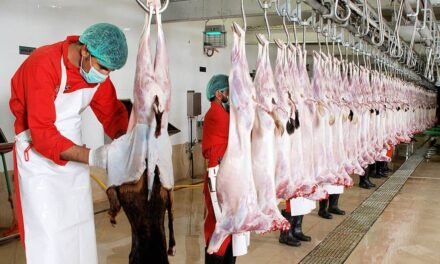The ban on cell-based meat in Italy is noteworthy as the country is a major meat importer. Violators can be subject to fines of up to 150,000 euros and risk being shut down.
ROME – Italy has become the first nation to ban lab-grown, cell-based meat. Italy’s lower house of parliament gave final approval for a law banning the use of laboratory-produced food and animal feed as angry farmers confronted a group of centrist lawmakers opposed to the bill.
The proposal, already approved by the upper house Senate, passed by 159 votes in favour to 53 against, prohibiting the use, sale, import and export of food and feed “from cell cultures or tissue derived from vertebrate animals”.
Factories breaching such rules can be subject to fines of up to 150,000 euros ($162,700) and risk being shut down, while owners may lose their right to obtain public funding for up to three years.
Italy made the move in a bid to protect its agricultural history and traditional culinary culture. The stance was first announced in March this year, when Italy’s Agriculture Minister, Francesco Lollobrigida, said that Italy was the first nation to say no to “synthetic” food as laboratory products do not guarantee quality or wellbeing, nor protect Italy’s culture and traditions.

Critics of the bill say producing meat without breeding animals would limit greenhouse gas emissions and provide an option for consumers who would appreciate eating a product that does not involve slaughter. The opposition warned the government risked breaching EU single market rules by unilaterally banning the product in case the bloc ever decided to make lab food available.
The measure also attacks the labelling of plant-based products, prohibiting the use of everyday names like ‘plant-based salami’ and ‘vegan steak’. This measure will directly affect Italian companies that make plant-based meat, which is regularly consumed by one in two Italians. Industry research indicates Italy as the third-largest European market for plant-based products.
In a statement, the Good Food Institute Europe (GFI) said that the move will reduce investment, push Italian researchers abroad and hinder the fight against climate change, while other European countries are investing in the sector.
Francesca Gallelli, public affairs consultant at the GFI Europe, said: “This bill not only deprives consumers of choice but also isolates Italy from the investment and job creation offered by this burgeoning industry. The debate surrounding cultivated meat in Italy has been fuelled by misinformation, as hearings in the Senate intentionally excluded cultivated meat companies and supporters while allowing false claims from opponents of this sustainable food.”
She continued: “We welcome the intention of the government to submit the law to the EU scrutiny, and we hope member states can voice their concerns regarding the potential violation of the single market.”
The decision to ban cell-based meat in the country holds particular significance given that Italy is a substantial importer of meat from both European and non-European countries. Supporting the domestic production of cell-based meat could play a crucial role in bridging this gap.
The Italian Alliance for Complementary Proteins, which brings together industry companies, researchers and non-profit associations, commented: “This bill tells Italians what they can and cannot eat, stifles innovation, and likely violates EU law. It is truly disheartening that Italy will be excluded from a new job-creating industry and barred from selling more climate-friendly foods. Once famous for pioneering world-changing innovations like radio, microchips, batteries, performance automobiles and ground-breaking fashion – Italian politicians are now choosing to go backwards while the rest of the world moves forward.”
A GFI survey of Italian consumers revealed that 55% are interested in buying cell-based meat, while 75% believe that the novel food is necessary to reduce the consumption of conventional meat.

















